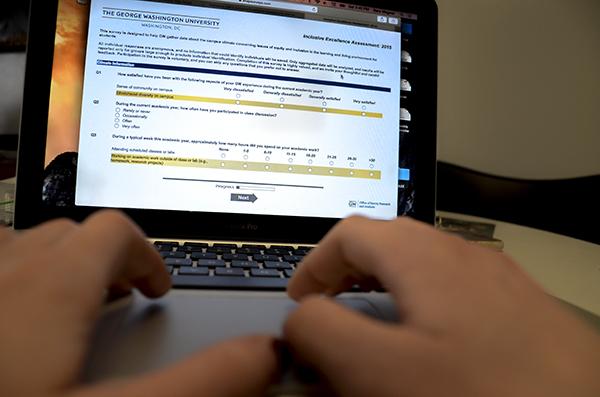GW released an email survey Thursday asking students about their social habits, relationships with faculty and how comfortable they feel on campus.
The release of the 31-question survey, issued by the Office of Diversity and Inclusion, marks the second time in the last year that the University has asked students to share their campus experiences. A sexual violence survey issued last spring asked whether students had experienced unwanted sexual behavior on campus or if they knew about GW’s resources.
Questions in this year’s survey range from whether students feel like they belong on campus to how often they interact with people who are a of a different race, religion or sexual orientation. Survey recipients were also asked about their connections with faculty, like whether they interact with professors outside of class, or if they know any administrators well enough to ask for a job recommendation. The survey was sent to select students’ GW email addresses.
Vice Provost for Diversity and Inclusion Terri Harris Reed told recipients in an email obtained by The Hatchet that the data would help GW “assess the climate of inclusion” on campus.
“This survey is designed to help GW gather data about the campus climate concerning issues of equity and inclusion in the learning and living environment for students,” Reed wrote.
Reed declined through a spokeswoman to say how many students received the survey, whether or when results will be released, why GW decided to conduct the survey, how much it will cost, how it was benchmarked against other schools and whether officials worked with other offices or student groups to craft the survey.
Many of GW’s peer schools – including Emory, Tulane and Georgetown universities – use annual diversity surveys.
“The survey, like many other surveys that the University and offices conduct throughout the year, is designed to help GW gather feedback and information about the campus,” University spokeswoman Maralee Csellar said.
The survey also has space for students to describe how GW has prepared them for a diverse world, and how they feel about the diversity and climate on campus.
Leaders of a number of multicultural organizations at GW, such as the Multicultural Greek Council and the Organization of Latino American Students, said they did not know about the survey before it was released.
Dawid Skalkowski, a freshman and history major who received the survey, said he didn’t know whether it would make an impact on diversity issues or the atmosphere on campus. He said officials should do more to reach out directly to students to address their concerns, instead of relying on survey data.
“I don’t understand why [University President Steven Knapp] or any members of the administration don’t hold town hall meetings with the student body in order to address our concerns,” Skalkowski said. “He has office hours, but I don’t understand why it is that we don’t come together as a University to address the problems together.”
Sophomore Joshua Serchen said officials should speak with minority students instead of issuing a survey randomly, which he said “in itself presents a problem.”
“As a white, straight, cisgendered man, I don’t really think that I am the best candidate to speak to the inclusivity of our campus climate,” Serchen said. Cisgendered means a person identifies with the gender that corresponds with their biological sex.







